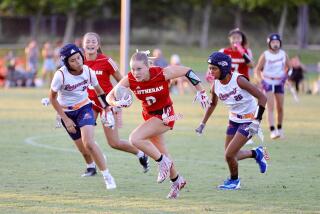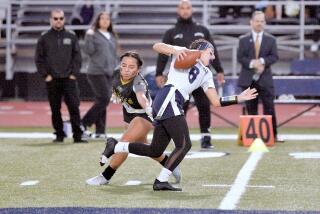Laguna Hills Plays It Smart, Wins State Title
BAKERSFIELD — It didn’t just take months of study and a keen knowledge of American Indians to bag first place in the California Academic Decathlon.
It took a little football too.
Saturday, the formula paid off big for the team of nine young men from Laguna Hills High School who endured two days of grueling competition to come from behind and prevail over more than 40 other teams.
During months of preparation, and again during the actual competition, the team members would put their books aside now and then and go out for stress-relieving games of football or basketball.
“You can’t just study for 10 hours straight,” said team captain Jeff McCombs, fresh from the joy of hearing at Saturday’s awards banquet that his team had won. The team’s toughest competition, second-place El Camino Real High School from Woodland Hills in Los Angeles County, “couldn’t believe we won because whenever they saw us, we were playing football,” McCombs said, chuckling.
He led his team to the first victory for an Orange County school in 11 years, but it came only after some harrowing moments.
“We knew we had it in our grasp, but we weren’t sure how close we would be to the top,” said McCombs, a senior. “There was a lot of stress, and we had to work hard (to prepare). But our team is unique. We’re self-motivated and really competitive.”
Teams from throughout California battled on subjects ranging from math and economics to fine arts and language.
The Orange County team scored 45,361 points in the contest, compared to the 44,829 points scored by El Camino.
It was the Laguna Hills team’s knowledge of American Indians that gave it the winning edge.
The team was fourth Friday morning when all nine team members began the essay-writing portion of the competition. The assignment dealt with the history of Indians in America, the same topic that was used in the Super Quiz, the final event of the decathlon.
“We did very well with the essay,” said Roger Gunderson, one of Laguna Hills’ two decathlon coaches. “They tell us we were in first after that.”
However, the team still had to face the Super Quiz, an event similar to a television game show in which the students are tested on the knowledge of a single subject as members of the audience cheer on their favorite schools. Laguna Hills placed third in that event.
The questions were tough: For instance, what kind of terrain did the Paiute Indian tribe inhabit? Answer: desert.
Here’s another: What is the name of the treaty in which the Chickasaw Indians gave up their land? Answer: the Dancing Rabbit Creek Treaty.
The tension mounted at Saturday afternoon’s awards ceremony as the judges announced the top 10 schools in reverse order, starting with 10th place. It soon became clear that Laguna Hills and El Camino would vie for the two top spots.
“We all had our heads down. I just wanted them to say either it’s El Camino or it’s Orange County,” McCombs said. “When they said El Camino was in second, we knew we had won. We just went crazy.”
The Orange County team has been together since September, and some members had studied for the decathlon an average of 15 hours a week ever since. It was the school’s second chance in two years to be state champ. Last year, it represented Orange County in the state competition but did not take top honors.
The next step for the team is the national competition April 20-22 in Des Moines, Iowa.
Most team members agreed that the schedule leading up to the state competition was rigorous, and some conceded they sometimes considered quitting because the workload became too rough.
“It’s like having 17 classes,” McCombs said. “It can be a real strain.”
Jack Dietz, 17, admitted that his decathlon duties forced him to miss a few of his lectures at UC Irvine, where he takes classes in addition to his high school course load.
“I was getting quite frustrated with the idea of studying,” Dietz said. “It was hard at times.”
Both team members and the coaches agreed that what kept the group going was fierce competitiveness and a desire to win.
The decathlon began in Orange County in the 1970s as a way of recognizing the academic achievements of students. All the teams are divided into three groups based on the grade-point average of the students.
McCombs, Jay Kim, 16, and Ryan Sakamoto, 16, are in the “A” student group. Mike Lee, 17, Todd Faurot, 16, and Dietz are in the “B” student group. Julian Kingston, 17, Jeff DeWit, 17, and Bill Fischer, 17, are in the “C” student group.
“This is an outstanding team. I can’t imagine another team in California with the brainpower (it has),” Coach Gunderson marveled. “The IQs are the same for the “A” students as for the “C” students. . . . That’s the key to a good team.”
More to Read
Get our high school sports newsletter
Prep Rally is devoted to the SoCal high school sports experience, bringing you scores, stories and a behind-the-scenes look at what makes prep sports so popular.
You may occasionally receive promotional content from the Los Angeles Times.






